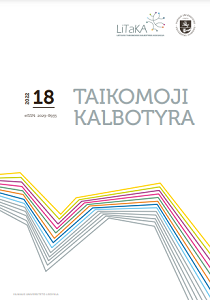Language as an Error: A Study on School Literacy and Language Correction in Lithuania
Language as an Error: A Study on School Literacy and Language Correction in Lithuania
Author(s): Author Not SpecifiedSubject(s): Language studies, Education, Sociolinguistics, Baltic Languages, School education, Sociology of Education, Pedagogy
Published by: Vilniaus Universiteto Leidykla
Keywords: Language as an Error; School Literacy; Language Correction;
Summary/Abstract: The title of this special issue Language as an Error is deliberately chosen to illustrate its main theoretical purpose. It seeks to critically intervene in the dominant normativist (or prescriptivist) paradigm of school literacy studies in Lithuania by showing the advantages of a (socio)linguistically informed approach to literacy development. The normativist perspective on literacy has as its epistemological basis only the ‘standard Lithuanian language,’ an abstract system of various rules prescribed by language authorities, called ‘the linguistic norm’ (kalbos norma) or simply ‘the norm’ (norma). In empirical terms, it seeks merely to identify ‘deviations from the norm,’ also called ‘language errors.’ Normativism is not specific to the Lithuanian schooling system and can be found amongst language teaching practitioners globally: it stems from the modernist idea that language can be fully standardised and that such standardization will have positive effects on society. Nor is the public ideology of school literacy specifically Lithuanian. The so-called problem of declining literacy rates of pupils has been a commonplace topic in media for decades around the globe. The blame usually lies with students and teachers who have not learned (or taught how) to properly adopt the standard. However, Lithuania is one of the few places where such undocumented beliefs have acquired the status of scientific discipline during the Soviet period, which goes by the name ‘Language Culture’ or ‘Sprachkultur’ (kalbos kultūra). Its empirical scope extends to identifying ‘deviations from the norm’ in the educational system, as well as printed and broadcast media, any type of literature; in fact, in all public use of language. The norms themselves are documented in detailed accounts of lexical, grammar, word formation ‘errors’ and even deviations in standard pronunciation and accentuation of words. And while this particular type of ‘errors’ is only one externally determined source for correcting school writing, the long presence of prescriptivist practices in society has influenced the general approach to teaching linguistic expression, which has become highly formalised and error-oriented. Since ‘the norm’ is both the starting and the end point of analysis, such an approach cannot tell anything about the actual language production amongst school pupils, nor can it explain the reasons behind the various linguistic choices made by them. This special issue features a study consisting of four main contributions where (socio)linguistically informed approaches to school literacy are presented, one theoretical and three empirical. The authors seek to explore pupils’ written language practices by focusing on variation in spelling, morphology and syntax, word choice as well as stylistic expression, as corrected by teachers, and approach the corrections in terms of language normalisation ideology. The data for the empirical contributions were retrieved from an anonymised database Rašinėliai (‘School Essays’) which some of the authors of the study have been collecting since 2014 for the purpose of school writing research in Lithuania. The database is based on various types of authentic texts for the subject Lithuanian language and literature, encompassing primary and upper secondary schools from different parts of the country. The pupils’ texts in the database are annotated by year, location, author’s gender, genre, grade and more. The database covers a period of nine decades (1930–2021), however, most of the essays are from the postWorld War II period, which is represented in the analysis in this study. At the time the study was conducted, the researchers could choose among more than 7,500 PDF files documenting writing by almost 950 different pupils between 1st and 12th grades, of which almost 80% were teacher-corrected.
Journal: Taikomoji kalbotyra
- Issue Year: 2022
- Issue No: 18
- Page Range: 151-155
- Page Count: 5
- Language: English

